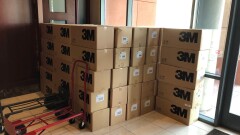The coronavirus pandemic has quickly reshaped much of American life and, in turn, the credit union industry.

Credit unions have had to do everything from giving members access to
Nonessential businesses have been closed and
To help soften this financial blow, Congress recently passed historic relief packages to get money into the hands of consumers and loans to struggling businesses. Paid leave benefits have also been
But a number of credit unions have also found their own unique ways to address the crisis and help their members and communities.
Read on for details of some of these examples.










